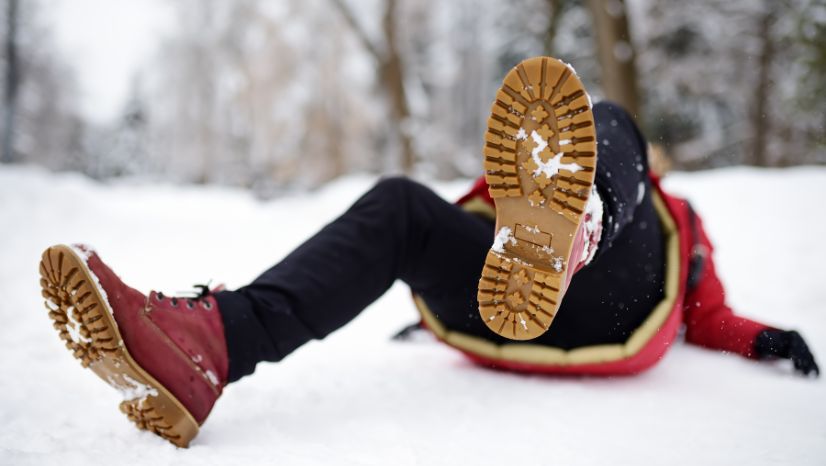

Snow and ice present several dangers, particularly during the winter months when conditions can quickly become hazardous. Ice on pavements, roads and car parks can be nearly invisible and extremely slippery, leading to falls that can result in fractures, head injuries or soft tissue injuries. Black ice is particularly difficult to detect as it forms when snow melts and refreezes. However, if you become injured as a result of someone’s negligence then you may be able to claim compensation.
Types of injury
- Soft tissue injuries and cuts
Slippery floors and pavements can lead to twisted ankles and knees with soft tissue damage, nerve damage or even severe cuts. - Dislocations, breaks and fractures
Falls and collisions on pavements, walkways or entrances can cause bone fractures and dislocations in the shoulder, hip, knee hand, leg and ankle. - Back injuries
Slips or falls while on ice can result in sprains, slipped discs, or serious spinal cord injuries. - Head injuries
If you fall and hit your head on the ground or another object your injuries can be anything from mild such as concussions to traumatic brain injuries.
Can I claim compensation?
Yes, you may be able to claim compensation if you slip on ice, but it shall depend on several factors such as the accident location and who is responsible for it. These include:
Accident Location
- Public Property Owned by the Council
You may be caused to slip and fall in a public place such as a pavement and/or road that is adopted by your local authority or the district responsible for maintaining the area. Local authorities are under a particular duty to ensure that safe passage along a highway is not endangered by snow or ice.
- Private Property (Owned by individuals and/or businesses)
You may be caused to slip and fall on private property owned by an individual or a business. You are entitled to claim compensation from property owners as they have a duty to visitors and customers to keep them safe whilst using the premises. This will include invoking the adverse weather policy, clearing snow and ice from car parks, and entrances to stores/buildings and ensuring proper gritting has taken place.
Evidence
To bring a successful personal injury claim for compensation, you will need to prove that the local authority or the occupier of the property was negligent in their duties to keep you safe from slipping on ice. This could mean that they failed to take all reasonable steps to prevent ice from forming, neglecting to apply salt or other materials to make the surface safe and failing to warn you and other visitors of the potential hazards of slipping.
You will need to produce evidence which can be in the form of:
- Witness Statements.
- Photographs of the ice and the area where you slipped.
- Medical records that will document that you slipped as a result of ice.
- An accident report that will serve as contemporaneous evidence of reporting the accident to the Council or business owner. Don’t forget to request a copy of the report.
Types of Compensation You Can Claim
As well as a claim for your pain and suffering, you may be entitled to claim for all other losses such as:
- Loss of Earnings: You might be entitled to compensation for any loss of earnings that was a direct result of the injury. You will need to provide evidence for this such as wage slips and bank statements.
- Care and Assistance: You might be entitled to compensation if you needed to require help from others whilst you were recovering from your injury. This can include helping you with cooking and washing up for you, cleaning your living space, helping to wash and dress you, gardening and even walking your dogs. The care would need to be evidenced so we advise you to keep a diary and document who provided you with care and the amount of time they spent caring for you.
- Medical Expenses: The costs of medical treatments, scans and medication can add up and can cause an inconsiderable amount of stress and inconvenience if you are unable to work as a result of your injuries. You will need to record all payments made and keep receipts and invoices.
What to do after a slip on ice or snow?
- Seek medical treatment and keep all records of dates, times and locations of treatment.
- Take photos/videos of the accident location to prove the existence of snow or ice. You can always ask a family member or friend to take them so your solicitors can help prove your claim.
- Get any witness contact details and if possible, insurance details from the relevant business or homeowner.
How do I prove negligence and make a claim?
At Express Solicitors, we have a team of specialist solicitors with over 20 years of experience in handling personal injury claims including those related to slips on ice and snow. With our no-win, no-fee agreement, you can bring a claim without the stress of upfront costs and legal fees.

